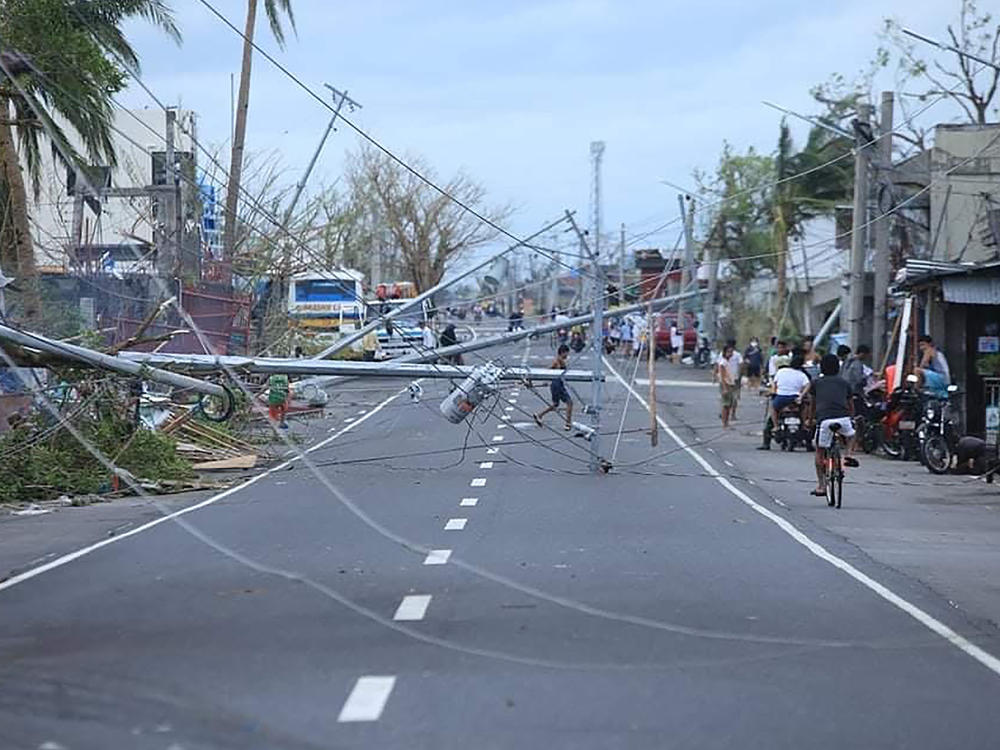Section Branding
Header Content
Powerful Typhoon Goni Slams The Philippines, Leaving At Least 10 Dead And 3 Missing
Primary Content
Recovery efforts are underway in the Philippines after Super Typhoon Goni brought flooding, mudslides and strong winds to its largest island early Sunday morning.
The storm, whose maximum wind speeds earned it the distinction of the year's most powerful cyclone, left at least 10 people dead and three missing. Regional authorities said 345,000 people are being housed in evacuation centers, with another 50,000 staying with relatives.
Goni, which is referred to locally as "Rolly," was downgraded to tropical storm status on Sunday evening local time. It is continuing to weaken over the West Philippine Sea, the Philippine Atmospheric, Geophysical and Astronomical Services Administration said.
It is likely to remain a tropical storm, the agency said, but could weaken into a tropical depression because of "increasingly unfavorable conditions."
Goni came days after Typhoon Molave had already killed 22 people in the Philippines.
Ahead of the storm, the international airport in Manila closed for 24 hours starting on Sunday. And nearly one million residents were preemptively evacuated, a process further complicated by the coronavirus pandemic — Johns Hopkins University puts the number of confirmed cases in the hard-hit Philippines at more than 383,000.
The storm intensified rapidly on Friday, adding 80 miles per hour to its maximum sustained winds in just 24 hours. Peak winds were estimated at 195 mph prior to landfall, which is equivalent to a Category 5 hurricane.
Meteorologists said that makes Goni one of the intense cyclones in history, and comparable in strength to Super Typhoon Haiyan, which killed more than 6,000 people when it battered the Philippines in 2013.
The eastern island province of Catanduanes first took the full front of Goni early Sunday, with sustained winds of 140 miles per hour and gusts of 174 miles per hour, The Associated Press reported. Communication, water and electricity are out.
Goni made landfall four times in Luzon, the country's most populous island, throughout the day Sunday. Storm surges inundated coastal towns, and flooded rivers overflowed.
Citing local officials, Reuters reported that the 10 recorded fatalities and three people reported missing were all in the region of Bicol, which encompasses the southern part of Luzon. Nine of those deaths were in the province of Albay.
The AP reports that in one Albay community, the typhoon triggered volcanic mudflows that "engulfed" about 150 houses.
Two of the deaths there were of a father and son trapped by the mudflow, and Albay Gov. Al Francis Bichara told local radio station DZMM that the boy was swept away and found 9 miles over in the next town.
Another villager in Albay was killed after being pinned by a fallen tree, the AP said.
In the Guinobatan municipality of Albay, Rep. Zaldy Co of the Ako Bicol party list tweeted that an estimated 300 houses were buried under rubble, with "several people believed to be buried alive."
The Philippine Red Cross confirmed casualties in Albay after a broken dike caused a river to overflow, and said it was coordinating with authorities to retrieve bodies.
Richard Gordon, a senator and the chairman of the Philippine Red Cross, said that 110 individuals in the city of Batangas were rescued after being stranded by high floodwaters.
He also provided updates about the extent of the damage in Catanduanes, where he said some 6,113 individuals were in 14 evacuation centers and 222 partially damaged houses had been recorded in the municipality of Pandan.
Mark Timbal, spokesperson for the Philippine's National Disaster Risk Reduction and Management Council, told the BBC on Sunday that 19 million people may have been affected by Goni's path, including populations in "danger zones for landslides, flooding, storm surges and even a lava flow."
Government officials held a press conference on Sunday to share updates on the storm and their response.
And as the Inquirer, an English-language newspaper, reported, #NasaanAngPangulo, or "Where is the president?" trended on Twitter after President Rodrigo Duterte was noticeably absent. A presidential spokesperson said Duterte was staying in his hometown of Davao and is scheduled to return to the capital Manila by Tuesday.
The storm is predicted to weaken further over the South China Sea in the coming days, and potentially bring flooding rainfall to Vietnam.
Goni was the 18th tropical cyclone to hit the country this year, which faces an average of 20 typhoons annually. And number 19 could come later this week: Tropical Storm Atsan, officials said, entered the Philippine Area of Responsibility early Sunday.
Julie McCarthy contributed reporting.
Copyright 2020 NPR. To see more, visit https://www.npr.org.

